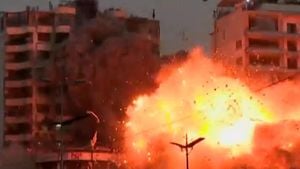Fistfights erupted on Monday inside the Serbian Parliament, reflecting rising tensions within the Balkan nation following the tragic roof collapse at the Novi Sad railway station, which resulted in the deaths of 15 people earlier this month. The incident has not only ignited public outrage but also prompted fierce political clashes as lawmakers grapple with the fallout of this deadly event.
Opposition legislators took to the parliamentary floor with banners, accusing the ruling coalition of attempting to evade accountability for the disaster. The chaos unfolded after Radomir Lazovic from the opposition Green-Left Front party placed a symbolic picture featuring a blood-stained hand on the speaker's platform, with the phrase "you have blood on your hands" emblazoned across it. Video footage broadcasted by local N1 television captured the heated moment when the opposition deputies unleashed shouts of "killers, killers," intensifying the spectacle of political discord.
This unrest follows the awful collapse of the train station’s roof, which witnessed many passengers beneath its structure during the incident. Many citizens expressed their anger during protests, demanding justice for the victims and accountability from government officials. Prime Minister Ana Brnabic has faced increasing scrutiny for the government’s handling of the situation, prompting her to state, "We're working hard to bring those responsible to justice."
The collapse has shaken the confidence of the populace, raising questions about the safety regulations governing public infrastructure, as well as about how oversight might have failed so spectacularly. The public’s fury is palpable, and many now wonder whether enough can truly be done to prevent such tragedies from occurring again.
Political observers noted this recent outburst of physical altercations and protests is indicative of broader dissatisfaction with the ruling party, particularly about perceived governmental negligence. The government has termed the incident as unfortunate, expressing condolences to the families of the victims, but allegations of neglect have proven difficult to shake off.
Further complicity surrounds the accusations leveled against the ruling party, particularly the coalition of the Serbian Progressive Party (SNS) led by President Aleksandar Vučić, who is already governing amid charges of authoritarian tendencies. Opposition leaders argue this latest scandal reflects systemic issues within the administration’s commitment to public safety.
“We demand accountability! We cannot allow our loved ones to face such senseless tragedies due to negligence,” said opposition leader Lazovic during his fiery address to the assembly. "This is not just about politics; it’s about human lives!" His words struck a chord, as many Serbians echoed the sentiment of outrage felt throughout the nation.
The brawl within parliament on Monday wasn’t simply about disagreements over policy but served as a microcosm of the rising tension across the country. With multiple parties representing the diverse agendas of Serbian citizens, the parliament appears more divided than ever, as lawmakers grapple with their responsibilities amid national grief.
The escalation of verbal and physical confrontation came to signify more than just tempers flaring; it’s illustrative of the emotional toll this collapse has had on the Serbian people. Reflection upon national infrastructural standards combined with the gravity of lost lives evokes grave feelings, compelling many to demand more from their leaders.
Many Serbians find themselves questioning the state’s ability to manage its infrastructure effectively; the Novi Sad railway reflects not only on the safety precautions taken by authorities but also on their broader effectiveness. Citizens are calling for thorough investigations, clarifying the circumstances surrounding the collapse, and demanding reforms to prevent future incidents.
Events like these often serve as bells tolling within political landscapes, igniting public passion and influencing future elections. The people’s uproar not only garners immediate attention to the tragedy at hand, but it also raises questions about political alignment and accountability—issues perceived to be tied closely with government mishaps.
The repercussions of Monday’s brawl may be far-reaching; representatives of both the government and opposition are faced with their constituents' harsh scrutiny. The incident acts as leverage for oppositionists trying to galvanize support amid rising criticisms toward ruling officials.
Serbia’s parliament has functioned as the battleground for longstanding political rivalries and social discontent. It remains to be seen how governmental bodies will navigate public anger following such tragedies and misfortunes. The aftermath of the station collapse is likely to influence upcoming discourse surrounding governance, as well as the fates of individual lawmakers.
With public trust wearing thin, reform advocates view the current tension as potentially pivotal. Observers note political responses to tragedies can either solidify or fracture public faith, determining the government’s legitimacy moving forward. The events within the assembly are still developing, but they encapsulate the bitter, emotional reactions of many citizens grappling with loss.
Historically, Serbia has been no stranger to political turmoil; the current events circle back to past governance disruptions and the repercussions stemming from them. The call for accountability emphasizes the need for more than just political speeches—genuine action must follow to restore public faith and prevent future tragedies.
Filmmakers, poets, and artists have typically portrayed public dissent, yet these recent events may inspire a wave of reflection among creative communities as well. The social fabric of the country intertwines deeply with how citizens view their leaders and their own futures, amid the backdrop of such chaos.
Civic engagement has begun to permeate the hearts of many Serbians, elevizing the need for structural changes within their government. Anger over the collapse of the Novi Sad station may very well be just the inoculation the populace calls for to catalyze larger shifts toward accountability.
Continued developments will be closely monitored, as both local and international observers shed light onto how Serbia’s political environment adapts to this new reality. The long-term impacts of this tragedy remain to be fully appreciated, but the initial discontent bred from the collapse will undoubtedly echo through the halls of power for months to come.



